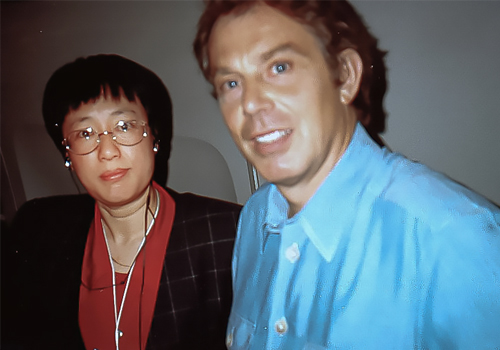As Yuwen Wu reflects on her fulfilling career at BBC News, she ties her success to a passion for English that was cultivated and perfected with a PhD in linguistics from Arts & Science and a full scholarship that made her seemingly impossible dream come true.
"In 1980s Beijing I was a university lecturer with an annual salary of C$234 in today’s value. There was no way I could afford the tuition fees and living expenses for a PhD program in the West,” she says.
“I am forever grateful.”
Growing up in Beijing amid China’s Cultural Revolution, Wu kindled a love for the English language from her father. He was an English teacher with essays to mark and Wu consumed every word. She was fascinated by the arrangements of letters spelling “Nixon” and “Watergate”.
“I didn’t aspire to be a journalist when I was very young, but studying English with my father was the starting point of everything,” says Wu.

Having an opportunity to later study for a PhD at U of T further broadened her horizons.
“Of course, I learned so much about the latest theories, but I also had this community of fellow students from diverse backgrounds. Each one brought a unique and valuable perspective that helped refine my craft and shape my world view.”
In choosing U of T, there was also a world-class education to consider, courtesy of instructors who were passionate about nurturing student success.
“I had a group of professors who devoted their lives to their subjects and were pioneers in their fields, but they had such a good interactive process with students that treated us as equals,” says Wu.
"They imparted ideas that were essential for our growth, not just in linguistics, but for our intellectual development and independence.”
After graduating from U of T in 1994, Wu was hired as a BBC radio producer for the Chinese Service in London in 1995.
A few years later, as senior producer, she secured an interview with Prime Minister Tony Blair during his first trip to China. One of the decade’s most popular politicians granted her 15 minutes on the flight home, and Wu didn’t falter in a high-pressure situation.
“I challenged him on certain issues, and we shared a few laughs. Back in London, my colleagues praised me for my professionalism and editorial judgement. That interview was a turning point in my journalism career,” she says.
The BBC rewarded Wu’s reputation for excellence with high-stakes assignments, including her revered coordination of reporting from China's monumental but also hugely controversial Olympic Games in 2008.
Her stock kept rising. Wu eventually became a leading expert for BBC World Service as the network’s East Asia and China specialist.
In a career highlight, Wu remembers commentating on the highly publicized trial verdict of controversial Chinese politician Bo Xilai in 2013 live on BBC World TV. For 90 harrowing minutes in front of lights and cameras, she rose to the occasion, providing context on breaking news for a captive international audience.
“I was so exhausted, I went home and collapsed on my bed. Just then, I got a message from the news director of the BBC praising me for my work. He said I really ‘wiped the floor’ with our competitors. I was so happy and so proud to get this compliment from the top brass and knowing that all my hard work paid off when it mattered.”
It’s a testing time to be a journalist now, with fast developing technology, a 24-hour news cycle and the wide spread of disinformation, Wu reflects.
“It’s our job as journalists to help our audience distinguish between what is real and what is fake, and that’s never been a more daunting task,” she says.
“Be curious and ask questions, because if things don’t look right, then you’re probably onto something.”
She may be basking in the warm glow of retirement, but Wu is still a contributor to the BBC and other British media outlets, having written on topics ranging from China’s population decline to the global pandemic and the war in Ukraine.
“I’m learning Spanish because my daughter has a Spanish boyfriend and I want to communicate with his family,” she says. “I’m also going to Greece, so I’ve been studying Greek with its letters which are unlike any other European language."
Wu pushes to stay in touch with her U of T roots. She’s a proud donor and has attended several alumni events in England.
All these years later, she still marvels at the exciting and accessible location of the St. George Campus, recalling the savoury scents wafting from idling food trucks outside Robarts Library.
“There was no dividing line between the city of Toronto and the school. I love that U of T is a seamlessly integrated pillar of the city’s identity."

